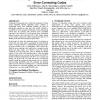Free Online Productivity Tools
i2Speak
i2Symbol
i2OCR
iTex2Img
iWeb2Print
iWeb2Shot
i2Type
iPdf2Split
iPdf2Merge
i2Bopomofo
i2Arabic
i2Style
i2Image
i2PDF
iLatex2Rtf
Sci2ools
132
click to vote
ISCA
2010
IEEE
2010
IEEE
Reducing cache power with low-cost, multi-bit error-correcting codes
Technology advancements have enabled the integration of large on-die embedded DRAM (eDRAM) caches. eDRAM is significantly denser than traditional SRAMs, but must be periodically refreshed to retain data. Like SRAM, eDRAM is susceptible to device variations, which play a role in determining refresh time for eDRAM cells. Refresh power potentially represents a large fraction of overall system power, particularly during low-power states when the CPU is idle. Future designs need to reduce cache power without incurring the high cost of flushing cache data when entering low-power states. In this paper, we show the significant impact of variations on refresh time and cache power consumption for large eDRAM caches. We propose Hi-ECC, a technique that incorporates multibit error-correcting codes to significantly reduce refresh rate. Multi-bit error-correcting codes usually have a complex decoder design and high storage cost. Hi-ECC avoids the decoder complexity by using strong ECC codes to iden...
EDRAM | Edram Cache | Hardware | ISCA 2010 | Refresh Power |
| Added | 02 Aug 2010 |
| Updated | 02 Aug 2010 |
| Type | Conference |
| Year | 2010 |
| Where | ISCA |
| Authors | Chris Wilkerson, Alaa R. Alameldeen, Zeshan Chishti, Wei Wu, Dinesh Somasekhar, Shih-Lien Lu |
Comments (0)

